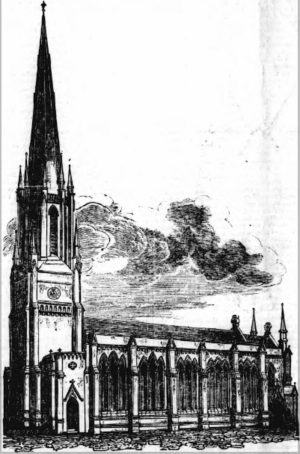Holy Trinity Church, Trinity Square facts for kids
Quick facts for kids Holy Trinity Church, Nottingham |
|
|---|---|

The church as pictured in the Nottingham Review and General Advertiser for the Midland Counties Friday 15 October 1841
|
|
| 52°57′22″N 1°8′56″W / 52.95611°N 1.14889°W | |
| Country | England |
| Denomination | Church of England |
| Churchmanship | Evangelical |
| History | |
| Dedication | Holy Trinity |
| Architecture | |
| Architect(s) | Henry Isaac Stevens |
| Style | Early English Period |
| Completed | 1841 |
| Construction cost | £10,000 |
| Demolished | 1958 |
| Specifications | |
| Capacity | 1215 |
| Length | 129 feet (39 m) |
| Width | 64 feet (20 m) |
| Spire height | 172 feet (52 m) rebuilt 2ft higher in 1861 |
| Administration | |
| Parish | Nottingham |
| Diocese | Diocese of Southwell |
| Province | York |
Holy Trinity Church was a Church of England church located in Nottingham, England. It served the community from 1841 until it closed in 1958.
Contents
History of Holy Trinity Church
This church was designed by the architect Henry Isaac Stevens. It was built in an old English style and was dedicated to the Holy Trinity. The church was officially opened on October 13, 1841. This ceremony was led by John Kaye, who was the Bishop of Lincoln at the time.
The church was quite large, measuring about 39 meters long and 20 meters wide. It featured a square tower with an octagonal (eight-sided) lantern on top. This lantern was about 7 meters tall and was topped with a spire that rose about 9 meters. Building the church cost around £10,000, which was a lot of money back then!
The land for the church came from an area called Burton Leys. This land was made available in 1839. The church was also created out of the larger parish of St. Mary's Church, Nottingham.
Building a Chapel of Ease
In 1859, the people of Holy Trinity Church built another smaller church nearby. This was called Trinity Free Church. It was built as a "chapel of ease." This meant it was a smaller church for people who lived too far from the main Holy Trinity Church. Later, this chapel became its own independent church, known as St. Stephen's Church, Bunker's Hill.
Restoration Work in 1873
The church was closed for a while in 1873 for a big renovation. During this time, the chancel (the area around the altar) was made longer by about 5 meters. The ceiling was also decorated with new designs. The old, tall, box-shaped pews (church benches) were made shorter. The organ, which was originally at the back of the church, was moved to the chancel area. This restoration work cost about £1,650 and was overseen by architect William Arthur Heazell.
The Tallest Spire in Nottingham
The spire of Holy Trinity Church was once the tallest in Nottingham. However, after heavy bombing during the Second World War (known as the Nottingham Blitz), the spire was declared unsafe. Even though there was some debate about whether the bombing actually caused the damage, the spire was removed by October 1942.
Some of the stones from the spire were reused in other places. They were used to create a new driveway at St John the Evangelist's Church, Carrington. Other stones were used to build a wall near St John's Church.
In 1954, a sad event occurred when Canon R.J.R. Skipper, a priest from Holy Trinity Church, Lenton, passed away while giving a sermon in the pulpit.
Church Leaders (Incumbents)
Here are some of the main leaders, called incumbents, who served at Holy Trinity Church over the years:
- Thomas Francis Penrose Hart Davies 1841–1851
- Thomas Mosse MacDonald 1851–1871
- James Allan Smith 1871–1885
- William Russell Blackett 1885–1892
- Percy Holbrook 1892–1934
- Albert Tom Cosford 1934–1936
- Robert Henry Makepeace 1936–1942
- Harry Holden 1942 – ????
The Church Organ
The organ at Holy Trinity Church was built by J.W. Walker and installed in 1845. It was updated in 1873 by Lloyd and Dudgeon of Nottingham. This was when it was moved from the back of the church to the front, in the newly extended chancel. When the church closed in 1958, the organ was moved to Holy Trinity Church in Clifton. However, it is no longer there today.
Organists of Holy Trinity
Many talented organists played music at Holy Trinity Church. Here are some of them:
- Mr. Wright ca. 1863
- Mr. Atkin ca. 1870
- W.Telford Cockrem 1871 – ????
- Charles Rogers ca. 1884
- Mr. Hibbert ca. 1893
- Jabez Hack ca. 1910
- Vernon Sydney Read 1913 – 1920
- H. F. Dunnicliff 1925 – 1928
- H. Blyton Dobson 1928 – 1936
- Cecil Thomas Payne 1936 – 1940
- Stanley Bell Nolan ca. 1941
- H. A. Gascoigne ???? – 1950
- Geoffrey Knight 1950 – ????
Closure and Demolition
Holy Trinity Church was torn down in 1958. The land where it stood, known as Trinity Square, was then used for a multi-storey car park. This car park remained there until 2006. Today, the area has been redeveloped into the Trinity Square shopping centre.
The name "Holy Trinity" was kept alive in Nottingham. A new church, called Holy Trinity Church, Clifton, opened in 1958 in the Nottingham suburb of Clifton.
 | Misty Copeland |
 | Raven Wilkinson |
 | Debra Austin |
 | Aesha Ash |

